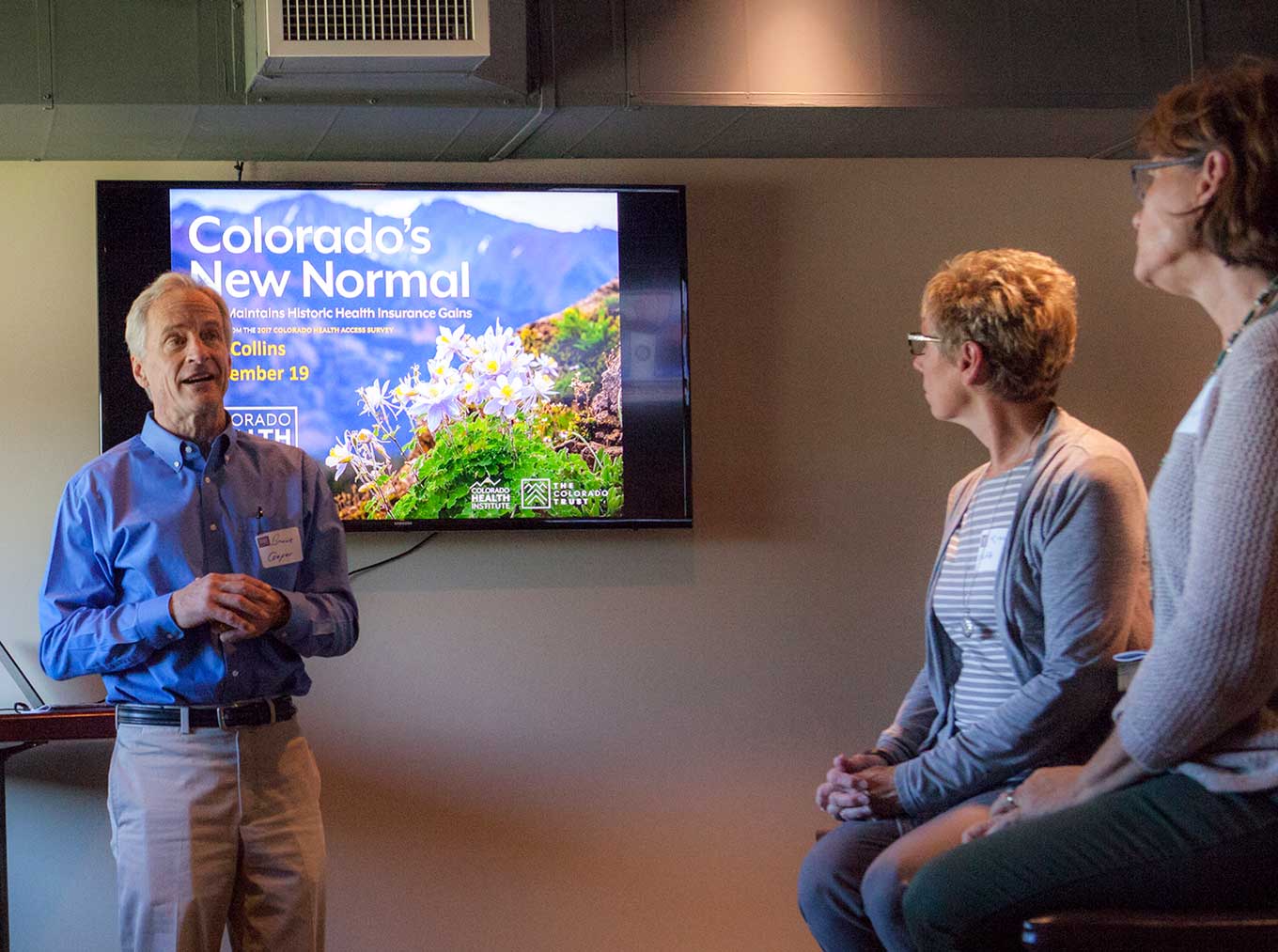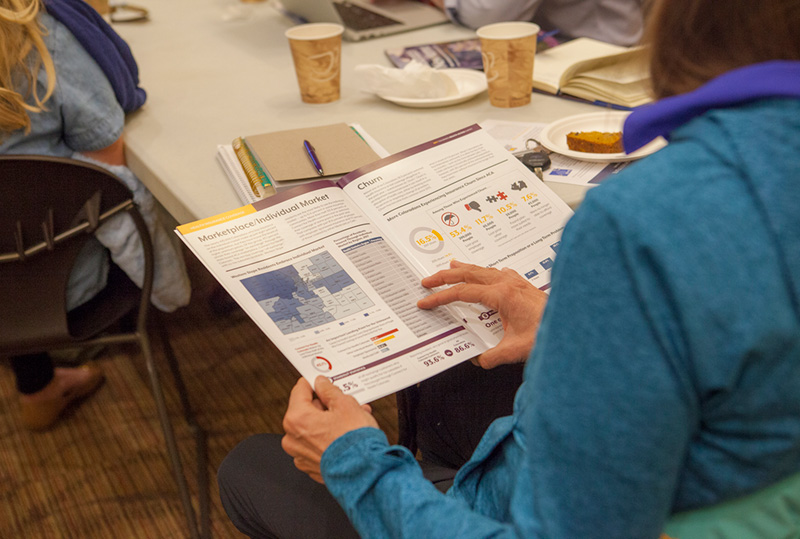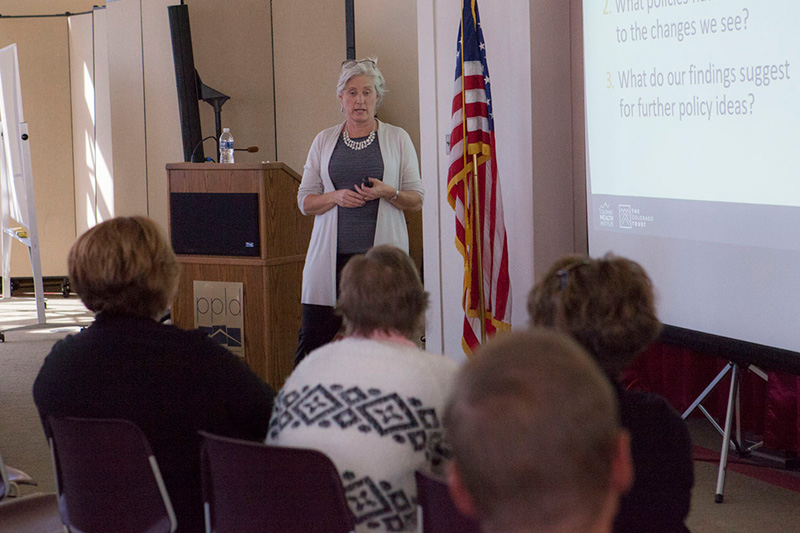40th Anniversary: Colorado Health Institute Collects Statewide Health Data as National Statistics Are Censored
Leer en español
Former Colorado Health Institute board member Bruce Cooper, who served as medical director for the Health District of Northern Larimer County, speaks at a Colorado Health Access Survey launch road trip event in 2017 Fort Collins, Colo. The health institute has been running the biennial survey since 2009, collecting statewide data to better understand health challenges across the state. Photo courtesy of the Colorado Health Institute
By Tatiana Flowers
The Colorado Health Institute has launched the 2025 iteration of its biennial health survey, compiling statewide data at a time when people across the country are concerned that health statistics, which have long been publicly available, will no longer be accessible.
Policymakers, researchers and business leaders use the results of the Colorado Health Access Survey to help them better understand Colorado’s health challenges and create solutions that promote well-being statewide.
In mid-February, the Colorado Health Institute (CHI) began collecting survey responses for its expansive survey, which launched in 2009.
About 10,000 randomly selected households have filled out the survey every other year since 2009, according to CHI. This year, CHI is more than 70% of the way toward its goal for survey completions and expects to have them completed by mid-to-late summer, according to Kristi Arellano, managing director of marketing and communications.
“It seems like people are potentially more willing to respond than usual,” said Suman Mathur, a CHI director. “It’s probably too early to draw conclusions from that yet. But I think it’s encouraging.”
Survey respondents answer questions about their physical and mental health, access to health care, their health insurance status, housing affordability and food insecurity. The survey also includes questions that help identify demographic trends about age, race and gender.

An audience member reviews Colorado Health Access Survey findings at a launch event in 2017 in Summit County, Colo. Photo courtesy of the Colorado Health Institute
The Colorado Trust was the original funder of the survey, providing financial support from 2009 to 2019. The Colorado Health Foundation was the main funder of the survey from 2019 to 2023.
The Colorado Trust is providing new funding in 2025 for the latest iteration. Other sponsors have included state agencies and smaller foundations.
CHI staffers said the health access survey is needed now more than ever—the Trump administration has been censoring public health data—and said they’re committed to publishing the Colorado results in a transparent way.
President Donald Trump has signed a record number of executive orders since he was inaugurated on Jan. 20, telling federal agencies how to interpret existing laws when they implement policies. Some of those executive orders have instructed the federal government to recognize only two genders and end federal funding for diversity, equity and inclusion programs, for example.
To comply with the orders, federal agencies removed thousands of web pages that included datasets, fact sheets and other important information about race, ethnicity, gender identity, vaccines, hate crimes, veterans’ care and scientific research, among other topics.
Some of the data has been republished online, after groups scrambled to preserve and archive important resources that help people make decisions about public policy, program effectiveness, business prospects and daily life nationwide.
In February, a federal judge ordered government agencies to restore public access to the health-related web pages and data that were removed. However, many Americans are now skeptical about the data’s accuracy and question whether all the data has been restored.
“We are starting to see that there are, frankly, some scary things happening with datasets and other surveys out there,” Mathur said. “We’re very committed to publishing and gathering data that captures things like race, ethnicity and gender identity and making that publicly accessible through our website, and in other ways, so the information is available for Coloradans.”
The Colorado Health Access Survey findings focus on access to health care, coverage and utilization trends statewide. Results are only released publicly in summary form and won’t affect anyone’s relationships with insurance or any government agencies, according to CHI.
The health institute plans to release the first set of findings for its 2025 survey at the end of this year. The website allows people to compare health trends that the organization has measured, in many cases, since the survey’s inception.
“We also publish a public-use file and a research file, so people can do their own analyses. We publish briefs that focus on different topics. We make geographic profiles about the uninsured rate, access to different kinds of health care and barriers to care,” said Lindsey Whittington, a CHI data and analysis manager. “We do presentations for folks online and in person and provide information at conferences to get the data out to as many people as possible.”
Colorado Trust funding helped CHI to gather, analyze and publish data for the Colorado Equity Compass, a community resource that allows people to access timely public health neighborhood-level information. (The Colorado Trust also supported the Colorado Equity Compass’s creation.)
“Now more than ever, it’s important to understand how people are being impacted by the systems we live in,” Whittington said. “The more we can highlight how people are thriving and having a hard time within these systems, that will help us better figure out solutions to help unburden those folks.”
CHI was founded in 2002, when leaders at The Colorado Trust, Rose Community Foundation and Caring for Colorado Foundation felt there was a need for more data and analysis to spur health policy conversations at the state legislature and elsewhere. Soon after, the three organizations provided funding to help create CHI to do some of that work, Arellano said.

Former Colorado Health Institute CEO Michele Lueck presents findings from the biennial Colorado Health Access Survey in 2017 at a Colorado Springs, Colo., launch event at the Penrose Library. Photo courtesy of the Colorado Health Institute
The health institute’s surveys have shown, for example, that from 2009 to 2023, fewer Coloradans reported that they’re uninsured.
However, the surveys also show that Coloradans are increasingly facing mental health struggles, especially in recent years—and they’re not able to afford mental health care or get health care appointments to address the issues.
Food insecurity is still a significant problem statewide, especially in southeastern Colorado, the San Luis Valley and Weld County, according to trends in the health institute’s survey results in recent years.
And lesbian, gay, bisexual, transgender and queer Coloradans are reporting that they feel disrespected or dismissed by medical providers, according to survey results.
When this year’s results are released, the data will help inform public health agencies working on community health needs assessments and improvement plans. CHI also receives questions from nonprofits, state agencies and others who need help analyzing the data, Whittington said.
Judith Alvarez, project director at Safe and Abundant Nutrition Alliance (SANA), which helps families in the Roaring Fork Valley access healthy food and public benefits programs, contacted CHI in January 2024 to better understand how food insecurity is affecting people in Eagle, Garfield and Pitkin counties (the communities SANA serves) and to help inform the organization’s work.
In July, CHI presented data to Alvarez and other local leaders. The presentation confirmed Alvarez’s suspicion: Food insecurity in the area had increased, especially after the COVID-19 pandemic, and public benefits like the Supplemental Nutrition Assistance Program were being underutilized by families in the Roaring Fork Valley.
To address the issue, SANA began helping families enroll in public benefits programs, assisting more than 700 families from June through December last year, Alvarez said in Spanish through a translator.
The Colorado Trust has provided almost $5.4 million in grants to CHI over the years, both in general operating support and to help CHI conduct the Colorado Health Access Survey. CHI is still fundraising and accepting grants for this year’s 2025 health access survey.
“We exist, in large part, because of The Colorado Trust and their financial support,” Arellano said.
“Since our founding, we have grown and brought in other funders, and the type of work we have done has changed over the years,” she added. “But that relationship with The Trust has continued, and they still fund us to do work in the community that supports data and evidence-based analysis.”